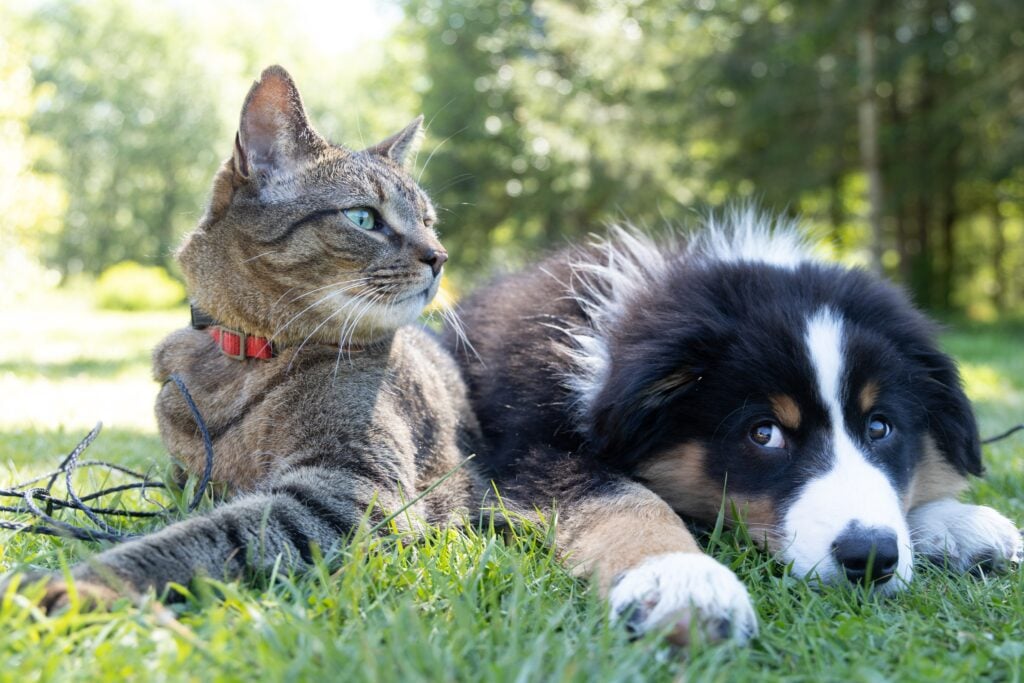- July 30, 2023
Multi-Pet Homes: Feeding Freshpet to Dogs and Cats Together

Due to their different dietary needs and eating behaviors,
handling meal times when you have both dogs and cats requires some extra
considerations. While this may seem daunting, the good news is that we’re here
with some tried and true tips on how to feed dogs and cats together!
Tip #1: Set up separate
feeding areas
When figuring out how to feed dogs and cats together, the first
thing you’ll want to do is to set up separate feeding areas. Having physical
separation between your dog and cat during meal time is the easiest way to
ensure that everyone sticks to their own meal. Cats also generally prefer
privacy while eating, so it’s best to feed them in a quiet area away from their
canine housemates.
If you don’t have separate rooms to feed them in, don’t worry.
You can maximize the space by focusing on vertical rather than horizontal
distance. Consider feeding your cats on an elevated surface, such as a counter
or shelf, to keep their food out of reach from dogs. Cats tend to prefer
elevated spaces as it gives them a better vantage point and sense of control
over their environment, so training them to eat on top of a higher surface
should be no problem.
Tip #2: Manage access
to their food
In addition to setting up separate feeding areas, it can be
helpful to generally manage your pet’s access to their food.
- Establish specific meal times: The easiest
way to ensure that your pet eats only their own food is to establish specific
meal times. Dogs often eat larger meals twice a day – once in the morning and
once in the evening – while cats prefer smaller, more frequent meals. Create a
routine that accommodates both your dog and cat, ensuring each pet receives the
necessary amount of food to meet their nutrition needs.
- Supervise meal times: Keep an eye on them during meal times, especially if you have a pet that has a habit of sneaking a bite from everyone else’s bowl. Each Freshpet recipe is designed with the nutritional needs of a specific species in mind. So while it’s not harmful if your dog eats a bit of your cat’s roll, or vice versa, their nutritional needs will be better met if they stick to their dedicated recipes.
- Use baby gates: Baby gates can also be
helpful to create dedicated spaces for your pets to eat their meals. While
you’ll still want to supervise them, having gates up can give you extra peace
of mind that everyone is eating only what they’ve been served.

Tip #3: Make use of
technology
As mentioned earlier, cats tend to eat smaller meals throughout
the day. In cat-only households, it’s common for food to be left out all day so
cats can eat as they please. However, in multi-pet households, you may not want
to leave food out for them all day as other pets can get into it.
Fortunately, pet technology has come a long way, with new
products dedicated to simplifying the process of feeding dogs and cats
together. Two popular options for multi-pet households are timer feeders and
RFID feeders:
- Timer feeders: With timer feeders, you can schedule smaller meals throughout the day so your cat can eat at a natural cadence without having a bowl sitting out in the open. These types of feeders are also a great option for puppies or older dogs who prefer to eat a few small meals during the day rather than two large ones. The iPettie automatic feeder allows you to schedule up to six meals throughout the day, plus, it has an ice pack below the tray to keep their favorite Freshpet recipe fresh.
- RFID feeders: These high-tech feeders are designed to only open for a specific pet based on their unique microchip identification or RFID collar tag. This ensures that each pet can access its food while preventing other pets from stealing or eating from their bowl. RFID feeders, like the Surefeed microchip feeder are a great option if you have pets on special diets or if they prefer to graze rather than eat everything at once. Just don’t forget that, like human food, Freshpet should not be out for more than an hour. If your pet doesn’t finish all of their food within that time, simply put it back in the fridge and offer it again later.
We hope you now have a better idea of how to feed dogs and cats
together. If you have any additional tips that you think would help pet
parents, share them in the comments!
Tags
What do you think?
Related Articles

New Puppy Checklist: Gear You’ll Need for Your New Dog
Getting a new puppy is really exciting, but before you welcome them home, it’s important to prepare your space for them. Since puppies need a

How Big Do Mini Poodles Get? Vet Reviewed Average Weight & Growth Chart – Dogster
The information is current and up-to-date in accordance with the latest veterinarian research. Learn more » When you buy a Miniature Poodle, you might not

Can Police Dogs Smell Nicotine? Vet Verified Facts & Info – Dogster
The information is current and up-to-date in accordance with the latest veterinarian research. Learn more » While cigarette sales have been declining steadily for decades,

How Old Is 5 in Dog Years? Vet-Approved Guide to Each Size of Dog – Dogster
The information is current and up-to-date in accordance with the latest veterinarian research. Learn more » A common method for calculating a dog’s age is

